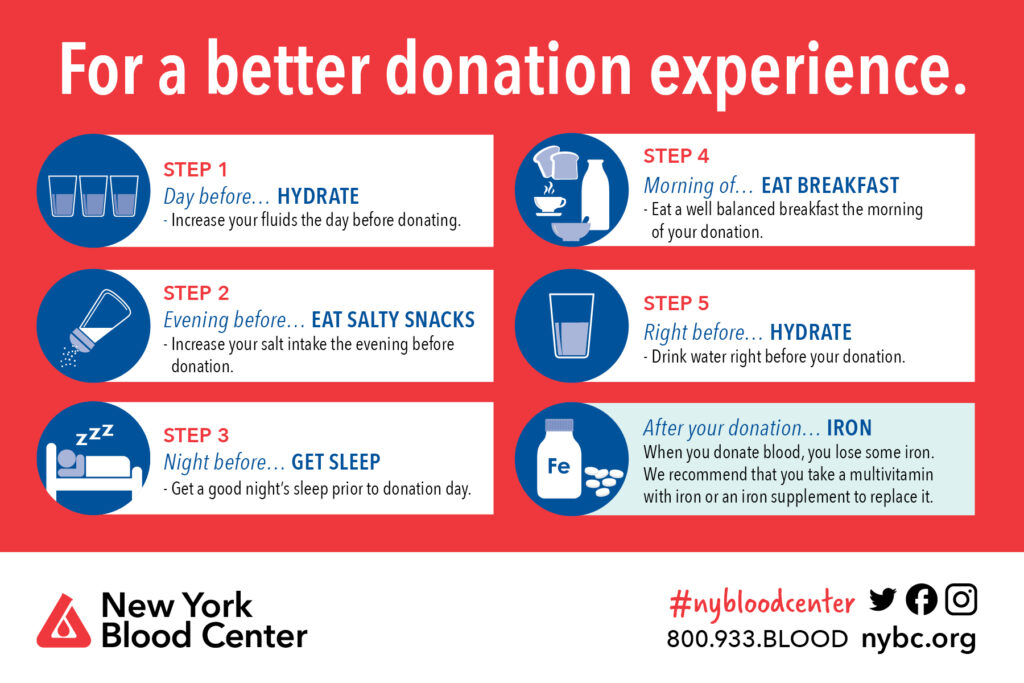What You Should Know Before You Donate Blood
January is National Blood Donor Month making it a great time to recognize and appreciate the lifesaving contributions made by blood donors! Blood donations are a safe and simple way to give back to your community. They are used to treat a wide range of medical conditions like anemia, cancer, bleeding disorders, traumas, and emergencies. They help people of all ages and can save lives.
According to the American Red Cross, someone in the U.S. needs blood every 2 seconds. Many blood centers experience shortages during the winter months due to factors like cold and flu season and holiday travel.
If you’ve never donated and the thought makes you nervous, we’d like to put those fears at rest with some good old-fashioned information. Here’s what you should expect before, during, and after you donate blood.
Before you donate, the best thing to do is make an appointment! Go to the American Red Cross website and find a blood drive near you. Making an appointment allows you to plan a convenient time that works best for you.
Want to make it fun? Ask a friend to make an appointment too and make a “donation date” to go together!
A day or two before your appointment, the New York Blood Center recommends the following for a better donation experience:
It is also recommended to wear comfortable clothing, and preferably a short-sleeved shirt for easy access to your arms for donating. You should also bring your ID and a list of any medications you are taking.
What to expect at your appointment:
Step 1
First, you will need to register and answer questions about your medical history, medications used, and recent travel. Often this is done on a laptop, tablet, or other device. Volunteers are handy if you need help.
Step 2
Next, a technician will check your blood pressure, pulse, and temperature. A drop of blood from your finger will be analyzed to measure your hematocrit level (proportion of red blood cells in your blood). If everything looks good, you will head to the donor area!
Step 3
Now, it’s time for the blood draw. A whole blood donation is about a pint of blood and takes about 15 minutes to complete. Some donations go faster or slower than others, so don’t stress about the time.
Everything needed to collect your donation will be new, sterile, disposable, and used only by you so disease transmission from another donor is not a worry.
Fun fact: the average adult has between 8 to 12 pints of blood in their bodies. For most, your body will replace your blood volume (plasma) within 24 hours, and your red blood cell count will be back up in 4 – 8 weeks.1
Step 4
When you are finished donating, it’s time to relax in the refreshments area and have a drink and a snack. It is not uncommon to feel a little lightheaded or dizzy right after you donate, so it is recommended to recover for a bit before resuming normal activities. If you feel dizzy, sit, or lie down, and notify someone if you need help.
You are discouraged from any strenuous activities or exercise for several hours after you donate. It is also suggested to drink extra liquids and avoid alcohol consumption for the next 24 hours.
Step 5
Smile big know the meaningful difference you just made and encourage others to donate too!
*****************************************************
Sources:
Sources:
1 https://www.nybc.org/donate-blood/become-donor/donation-process/
American Red Cross website: https://www.redcrossblood.org/donate-blood/blood-donation-process/before-during-after.html
New York Blood Center website: https://www.nybc.org/donate-blood/become-donor/donation-process/
Disclaimer
We want you to be well and to live your best life. The content in this blog is provided for the purposes to educate and entertain you: our very important reader. It is not intended as medical advice or as a substitute for medical advice from a trained healthcare professional.
If you have a medical condition or are under the care of a medical provider, please always seek the advice of a qualified medical professional before undertaking a new health care regimen. To that point, never disregard medical advice or delay treatment for a medical condition because of something you read on this site.
Listen to your care providers as they know you and your condition best. Thank you for reading!
The Team at BSDI

